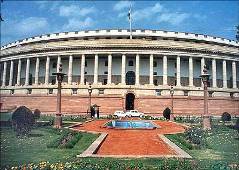 Despite fiscal deficit touching 6.8 per cent and rising, the second United Progressive Alliance government will make social sector spending the centrepiece of Budget 2010-11.
Despite fiscal deficit touching 6.8 per cent and rising, the second United Progressive Alliance government will make social sector spending the centrepiece of Budget 2010-11.
To pay for this, more disinvestment of state-run enterprises would become necessary in the next financial year, top government sources said.
The Budget is likely to implement the Congress's poll promise of a Food Security Bill, apart from increasing funds for schemes under the Mahatma Gandhi National Rural Employment Guarantee Act, earlier known as NREGA.
The rural development ministry has sought an almost four-fold increase in funds for another programme -- the National Rural Livelihood Mission.
Sources in the government suggest the Food Security Bill, which aims to provide subsidised grain at Rs 3 per kg to below poverty line households, would mean an expenditure of Rs 25,000 crore or Rs 250 billion (on the basis of the current BPL population).
But party president Sonia Gandhi is keen that her government continues to cater for the aam aadmi (common people). States like Andhra Pradesh have implemented the subsidised grain scheme to proven electoral advantage.
Agriculture and food minister Sharad Pawar may bring the Bill during the Budget session.
According to the Planning Commission's 2004-05 estimates, BPL population is 300 million.
According to the rural development ministry's 2002 poverty census, India has over 400 million poor people.
Suresh Tendulkar Committee, in its report to the Planning Commission, has marked 42 per cent of India's population as BPL. The Plan panel is yet to deliver its verdict on this report.
"If the Plan panel agrees to increase the number, the cost of food guarantee programme may double," said a United Progressive Alliance minister.
The rural development ministry has sought more than 65 per cent increase in funds for the rural job guarantee schemes. While it wants Rs 66,300 crore (Rs 663 billion) for MGNREGA in the next financial year, it has sought Rs 10,500 crore (Rs 105 billion) for NRLM projects under the public-private partnership model.
It is an expanded and improved version of the government's Swarnajayanti Gram Swarozgar Yojna, which had a budget of Rs 2,350 crore (Rs 23.5 billion) in 2009-10.
The scheme allows private enterprises and NGOs to develop various skills of the rural population with guarantee to provide jobs afterwards.
Rural development secretary Rita Sharma told Business Standard, "We have projects sanctioned for 600,000 people. It has so far trained 100,000 rural youths. Out of them, 80,000 have already got jobs."
The government bears the cost of the training as a subsidy subject to the condition that the private parties would provide jobs to the trainees.
NRLM has 15 private partners.
"We have noticed increased interest among private enterprises and NGOs to participate in this programme. We have received many proposals from them. We want to expand it in the next fiscal," Sharma said. The target is to provide employment to 50 million BPL families over the next seven years.
The ministry estimates that the construction sector will need 10 million skilled workers.
Similarly, 10 million workers can be absorbed in the textile sector. The food processing industry, another emerging area, will require 5 million people.
While these three industries would provide two-and-a-half-crore BPL families with work, the rest would be self-employed.






